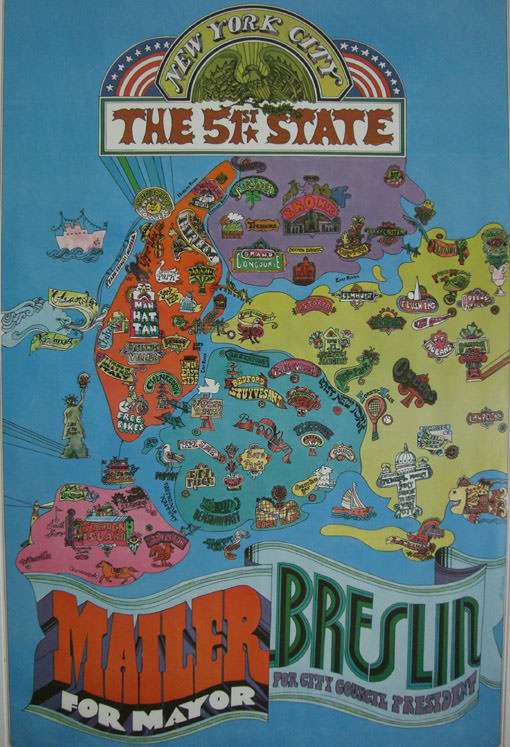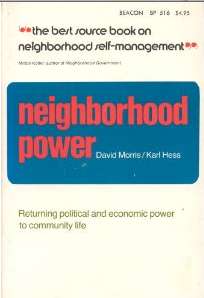All Power to the Neighborhoods
One of the great forgotten left/right/libertarian crossover crusades of the last half-century was the Neighborhood Power movement of the 1960s and '70s, which called for devolving as much power as possible to the most granularly local level. I'm glad to see the alliance attracting attention from a professional historian, in Benjamin Looker's Journal of Urban History article "Visions of Autonomy." Looker is particularly interested in the roles played by Milton Kotler, a man of the left, and Karl Hess, a libertarian.
The full article is behind a paywall, alas. But here are some highlights:

* When Murray Rothbard's Libertarian Forum praised Kotler's book Neighborhood Government in 1969, Kotler was "invited to discuss his ideas with members of Governor Ronald Reagan's California state cabinet"; by Kotler's account, the "group was taken aback…when they learned of his background in Mississippi civil rights work and his visions for inner-city political empowerment." The most amazing thing here, assuming that Kotler hasn't misremembered which journal inspired the invitation, is that someone in Reagan's office was reading The Libertarian Forum. (In the issue that recommended Kotler's book, the lead article calls Vietnam "a war fought by imperial America and a few of its puppets in Saigon against the liberation movement of the Vietnamese people"; the same piece speculates about what will happen "if Nixon-Agnew attempt open fascism." And the Reaganites were surprised to meet a civil rights worker?)
* When Jimmy Carter's White House wooed the movement, by contrast, parts of the Democratic coalition worried that "community control" was code for "an agenda of aggrieved blue-collar whites who sought to exclude people of color from their local schools and neighborhoods." Back when the Panthers were riding high, the phrase community control had one set of connotations; in the wake of the busing battles, it had another. Indeed, "By 1978, NAACP chief Benjamin Hooks was fretting that the very word neighborhood had come to stand exclusively for white urban districts." (This wasn't a simple black/white split. Looker doesn't mention it, but a 1975 National Opinion Research Center poll found 53 percent of American blacks opposed to busing -- a sign that much of the black community still liked the idea of local control, even if mainline civil rights leaders were warier.)
* The leftist Institute for Policy Studies was deeply interested in these ideas in the 1960s and '70s. Kotler was a fellow there, Hess participated in many of the institute's activities, and the group sponsored a lot of decentralist projects. These days, by contrast, urban devolution hardly seems to be on the IPS radar screen at all.

* IPS isn't the only organization that has evolved. In 1976, the Alliance for Neighborhood Government released a bicentennial manifesto "which demanded for urbanites the right to 'govern themselves democratically and justly' at the neighborhood level." Three years later, the National Association of Neighborhoods -- an ANG spinoff that supplanted the earlier organization -- released a platform that downplayed neighborhood sovereignty and "instead incorporated a checklist of traditional left-Democratic policy items, all envisioning a substantially increased role for central government." As Looker notes, "many of these positions were anathema to the blue-collar Catholic communities that had come to compose a sizable chunk of the NAN membership." Several of the group's founders left, the association declined in strength, and by the '90s the remaining shell had adopted yet another persona: "a corporate-friendly pressure group defending electrical and telecom deregulation, subprime mortgage lenders, elimination of the estate tax, and the rollback of environmental legislation."
Here's your full citation: Benjamin Looker, "Visions of Autonomy: The New Left and the Neighborhood Government Movement of the 1970s," Journal of Urban History 38:3 (May 2012).
Elsewhere in Reason: The national politician most sympathetic to the movement was Oregon Sen. Mark Hatfield, and when he died last year I discussed his Neighborhood Government Act. And while we don't have any of Karl Hess' urban visions of the '70s in our archives, he did offer this rural counterpart in 1978.
Elsewhere not in Reason: I discussed some similar issues from an earlier era, including the precursors to the '70s debates about localism and race, when I wrote this piece about Saul Alinsky.


Show Comments (12)